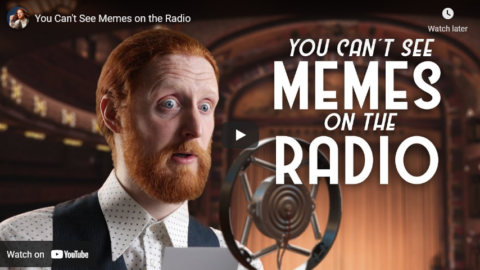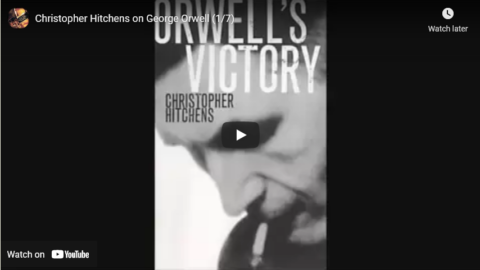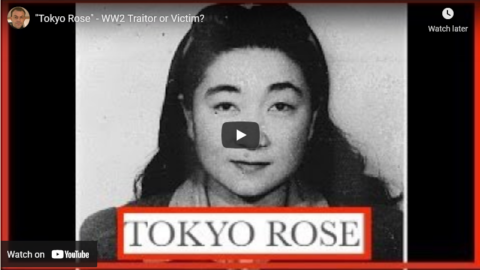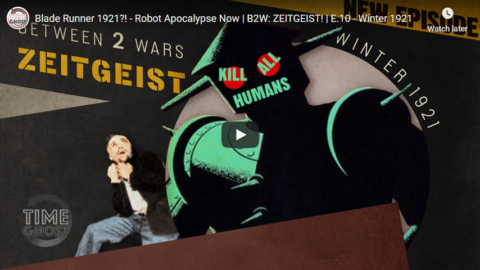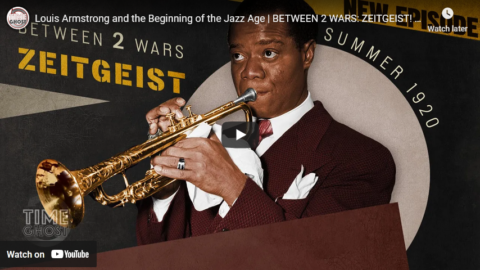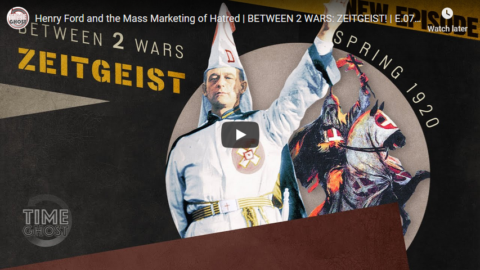World War Two
Published 14 Nov 2021As the Winter of 1942/43 is beginning, the German Nazis are under more and more pressure, both on the frontlines and in the occupation zones.
(more…)
November 15, 2021
Fighting Nazis with Radios and Funerals – WAH 046 – November 1942, Pt. 1
September 20, 2021
You Can’t See Memes on the Radio
Alasdair Beckett-King
Published 4 Jun 2021The hottest memes on 1940s radio. Support me on kofi (https://ko-fi.com/misterabk) and/or laboriously describe your favourite memes in the comments.
Carbon ringmount microphone model by Inlite: https://blendswap.com/blend/6724
August 1, 2021
July 1, 2021
Woodrow Wilson, Isolationism, and the Birth of the Charleston | B2W:ZEITGEIST! I E.20 Harvest 1923
TimeGhost History
Published 30 Jun 2021Wilson won the Nobel Peace Prize for crafting the League of Nations at Versailles, but even he couldn’t bring America out of its isolationism. This season he pours out his disappointment in his first-ever radio address. Optimism still reigns in the world of popular culture though, this season the Charleston is born.
(more…)
June 6, 2021
April 29, 2021
“Tokyo Rose” – WW2 Traitor or Victim?
Mark Felton Productions
Published 28 Apr 2021This is the story of “Tokyo Rose”, a Japanese-American from LA who broadcast propaganda for the Japanese during WW2. Was she a traitor or a victim?
Dr. Mark Felton is a well-known British historian, the author of 22 non-fiction books, including bestsellers Zero Night and Castle of the Eagles, both currently being developed into movies in Hollywood. In addition to writing, Mark also appears regularly in television documentaries around the world, including on The History Channel, Netflix, National Geographic, Quest, American Heroes Channel and RMC Decouverte. His books have formed the background to several TV and radio documentaries. More information about Mark can be found at: https://en.wikipedia.org/wiki/Mark_Fe…
Visit my audio book channel ‘War Stories with Mark Felton’: https://youtu.be/xszsAzbHcPEHelp support my channel:
https://www.paypal.me/markfeltonprodu…
https://www.patreon.com/markfeltonpro…Disclaimer: All opinions and comments expressed in the “Comments” section do not reflect the opinions of Mark Felton Productions. All opinions and comments should contribute to the dialogue. Mark Felton Productions does not condone written attacks, insults, racism, sexism, extremism, violence or otherwise questionable comments or material in the “Comments” section, and reserves the right to delete any comment violating this rule or to block any poster from the channel.
January 28, 2021
Blade Runner 1921?! – Robot Apocalypse Now | B2W: ZEITGEIST! | E.10 – Winter 1921
TimeGhost History
Published 27 Jan 20201Modern technology promises a lot, but it can also bring unprecedented horror. This season, the people of Czechoslovakia get to see that for themselves.
Join us on Patreon: https://www.patreon.com/TimeGhostHistory
Hosted by: Indy Neidell
Written by: Francis van Berkel
Director: Astrid Deinhard
Producers: Astrid Deinhard and Spartacus Olsson
Executive Producers: Astrid Deinhard, Indy Neidell, Spartacus Olsson, Bodo Rittenauer
Creative Producer: Maria Kyhle
Post-Production Director: Wieke Kapteijns
Research by: Francis van Berkel
Edited by: Michał Zbojna
Sound design: Marek KamińskiColorizations:
Daniel Weiss – https://www.facebook.com/TheYankeeCol…
Mikołaj Uchman
Norman Stewart – https://oldtimesincolor.blogspot.com/
Mikołaj Cackowski
KlimbimSources:
Some images from the Library of Congress
Bibliotheque nationale de FranceIcons from The Noun Project:
– noun_Sound_3530255
– Microphone by Agung Cahyo sSoundtracks from Epidemic Sound:
“Epic Adventure Theme 3” – Håkan Eriksson
“I Am Unbreakable” – Niklas Johansson
“Waiting like the Storm” – Rand Aldo
“Le Chat Noir 1” – Martin Landh
“A Single Grain Of Rice” – Yi Nantiro
“Alleys of Buenos Aires” – Tiki Tiki
“Age Of Men” – Jo WandriniArchive by Screenocean/Reuters https://www.screenocean.com.
A TimeGhost chronological documentary produced by OnLion Entertainment GmbH.
From the comments:
TimeGhost History
1 day ago (edited)
Episode 10 of the series and for the first time we’re looking at a decidedly negative outcome that people imagined might come with further technological progress. Over 100 years later and it’s still something people are fearful of, and it often feels like Artificial Intelligence providing a real threat to humanity’s existence is just around the corner.We’d be interested to know what you guys all think. Is there a chance that something along the lines of what Čapek imagined actually happening? Let us know in the comments.
NOTE: Unfortunately an error has snuck into this week’s episode. The portrait that is supposed to show Herbert Hoover is in fact of his son, Herbert Hoover Jr. We are working on getting this fixed as fast as possible, and we apologize for the inconvenience in the meantime.
December 31, 2020
Louis Armstrong and the Beginning of the Jazz Age | BETWEEN 2 WARS: ZEITGEIST! I E.08 – Summer 1920
TimeGhost History
Published 30 Dec 2020Louis Armstrong will be one of the greats of the American Century. But before that, others have to blaze a trail for him. No mean feat in a land of racial tension…
Join us on Patreon: https://www.patreon.com/TimeGhostHistory
Hosted by: Indy Neidell
Written by: Indy Neidell and Francis van Berkel
Director: Astrid Deinhard
Producers: Astrid Deinhard and Spartacus Olsson
Executive Producers: Astrid Deinhard, Indy Neidell, Spartacus Olsson, Bodo Rittenauer
Creative Producer: Maria Kyhle
Post-Production Director: Wieke Kapteijns
Research by: Indy Neidell and Francis van Berkel
Edited by: Michał Zbojna
Sound design: Marek Kamiński
Colorizations: Mikołaj Uchman and Spartacus OlssonSources:
Some images from the Library of CongressFrom the Noun Project:
world by Arafat Uddin
Stamp by Made
questions by Gregor Cresnar
Money by DARAYANI
Money Bag by HAMEL KHALED
people by Florent LenormandSoundtracks from Epidemic Sound:
“Epic Adventure Theme 3” – Håkan Eriksson
“You’re Trouble” – Rich in Rags
“1920s Chicago 2” – Magnus Ringblom
“It’s Not a Game” – Philip Ayers
“Weapon of Choice” – Fabien Tell
“On the Edge of Change” – Brightarm Orchestra
“For the Many STEMS INSTRUMENTS” – Jon Bjork
“Easy Target” – Rannar Sillard
“Step on It” – Golden Age RadioArchive by Screenocean/Reuters https://www.screenocean.com.
A TimeGhost chronological documentary produced by OnLion Entertainment GmbH.
December 17, 2020
Henry Ford and the Mass Marketing of Hatred | BETWEEN 2 WARS: ZEITGEIST! | E.07 – Spring 1920
TimeGhost History
Published 16 Dec 2020Racist conspiracies are on the rise in America. But other hysterias are also lessening. Will there be a return to normalcy?
Join us on Patreon: https://www.patreon.com/TimeGhostHistory
Hosted by: Indy Neidell
Written by: Indy Neidell and Francis van Berkel
Director: Astrid Deinhard
Producers: Astrid Deinhard and Spartacus Olsson
Executive Producers: Astrid Deinhard, Indy Neidell, Spartacus Olsson, Bodo Rittenauer
Creative Producer: Maria Kyhle
Post-Production Director: Wieke Kapteijns
Research by: Indy Neidell and Francis van Berkel
Image Research by: Daniel Weiss
Edited by: Daniel Weiss
Sound design: Marek KamińskiColorizations:
Daniel Weiss – https://www.facebook.com/TheYankeeCol…
Spartacus Olsson
Mikolaj UchmanSources:
Some images from the Library of Congress
Portrait from Bibliotheque Nationale FrancaiseFrom the Noun Project:
– agreement by Vectors Point
– film camera by Chanut is Industries, TH
– cowboy man by Adrien Coquet
– Protest by Juan Pablo Bravo
– Immigrants by Luis Prado
– pair figure skating by Andrei Yushchenko
– singles figure skating by Andrei Yushchenko
– Letter by Mochammad Kafi
– speech by Juan Pablo Bravo, CL
– universe by Icongeek26
– Arrow by IconTrack
– Galaxy By VictorulerSoundtracks from Epidemic Sound
– One More for the Road – Golden Age Radio
– “First Responders” – Skrya
– “Guilty Shadows 4” – Andreas Jamsheree
– “Slow Discovery” – Cobby Costa
– “Try and Catch Us Now” – David Celeste
– “The Inspector 4” – Johannes Bornlöf
– “Deviation In Time” – Johannes Bornlof
– “Disciples of Sun Tzu” – Christian AndersenArchive by Screenocean/Reuters https://www.screenocean.com.
A TimeGhost chronological documentary produced by OnLion Entertainment GmbH.
October 17, 2020
QotD: The inherent triviality of most “news” programs
Anyone who has ever appeared on a radio discussion programme will know how frustrating the whole business is. The time allotted even for the most serious subjects is short: a BBC producer once invited me on to a “long” discussion about the burning issue of the day, and when I asked what she meant by long, she replied with neither irony nor shame, but perfectly matter-of-factly, “Six minutes”. Since there were to be three other guests on the programme, in-depth analysis was hardly the order of the day. Brevity these days is not the soul of wit: it is the guarantor of triviality.
Anthony Daniels, “The European Working Time Directive & the Sound-Bite Culture: why the latter makes arguing against the former impossible”, The Social Affairs Unit, 2004-08-09.
October 9, 2020
Speaking in code and public health
In The Line, Joshua Hind relates the tragedy that forced US emergency services to wean themselves off their many confusing (and sometimes conflicting) spoken codes and use plain language to help reduce tragic misunderstandings among different emergency response organizations:
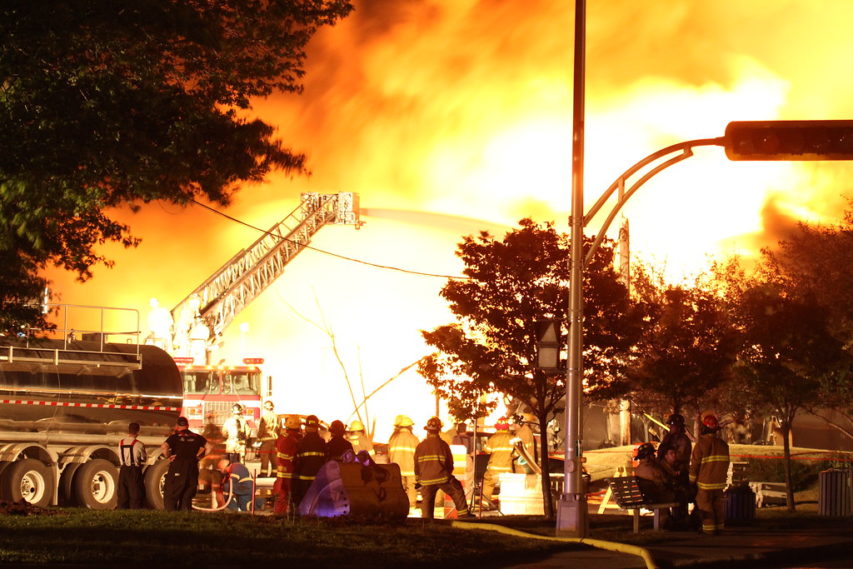
“First responders on site of the Lac-Megantic train derailment” by TSBCanada is licensed under CC BY-NC-ND 2.0
In the beginning, it was standardized, and the best-known codes, like “10-4,” were consistent from town to town or state to state. But it didn’t take long for newer codes to emerge, which often meant different things depending on where you were. Efforts to reorganize the codes every 20 years or so only compounded the problem. On a local level, in any one town, it wasn’t a problem. But when cops or firefighters from different towns had to work together it could lead to disaster.
In 1970, a particularly severe wildfire season in California killed 16 people in a 13-day period and laid bare the cost of bad interagency communication. The rat’s nest of codes, abbreviations, and jargon prevented firefighters from different towns from communicating with the speed and clarity a major disaster demands. To address the problem, the U.S. Forest Service created FIRESCOPE, the first complete system for organizing and managing major incidents. One of the primary principles of this new system was to “develop standard terminology.”
Despite this effort, which later went national and then international (the province of Ontario has its own version, the “Incident Management System”) coded language continued to proliferate. Nearly 30 years after FIRESCOPE was launched, on September 11th, incompatible technology, lack of protocols, and a refusal to harmonize terminology likely contributed to the deaths of 121 firefighters who were caught in the collapse of the North Tower because they either didn’t hear or couldn’t understand the warnings that the building was about to fail.
Which brings us back to 2006, and FEMA’s notice to first responders. After decades of asking agencies to stop using coded language, the federal government made funding contingent on compliance. “The use of plain language in emergency response is a matter of public safety,” the memo’s introduction read. “There simply is little or no room for misunderstanding in an emergency situation.” From that point forward, all interdepartmental communication would have to be un-coded. A fire would be called “fire.” A shooting would be “a shooting.” And if you needed help, you’d say “HELP!”
Police, fire departments and paramedics slowly but surely got on board and started using some form of the incident management system which included plain language. As use of the system spread, other sectors, like large music festivals and other live events, began adopting the concepts to better synchronize public safety programs with the first responders who support them. Today it’s not unusual for producers, technicians and event security staff to attend training at the police college right next to fire captains and police officers.
Then COVID-19 happened, and we realized that no one had told Public Health.
September 22, 2020
An idea for the blighted 21st century — Radio Free Earth and an updated “Liberator” pistol
In the most recent edition of the Libertarian Enterprise, L. Neil Smith considers a couple of ways to help oppressed peoples all around the world:

An example of the original Liberator pistol from WW2.
Screen capture from a Forgotten Weapons video.
The first is an idea that I originally read about in the 1950s in a short story by Arthur C. Clarke, author of 2001: A Space Odyssey. There’s a satisfying irony about using it against the Chinese communists,since Clarke himself was an ardent collectivist (among other nasty things) and wrote about it as a way that communists might bring Western Civilization to its knees. Building on Clarke’s original concept, imagine a tiny radio receiver, tuned only to a single frequency, with no moving parts, small enough to fit almost entirely into the human ear, and with the right coloration to be virtually invisible.
Now imagine a geostationary satellite standing 22,300 miles in space over China. The basic idea is like Radio Free Europe, but with significant differences. Instead of dull propaganda (I listened to some of those RFE and Voice of America broadcasts), there would be readings by celebrities like James Earl Jones and Dennis Haysbert from the works of Thomas Paine, Thomas Jefferson, George Mason, and other Founding Fathers. Nineteenth century thinkers like Herbert Spencer, Auberon Herbert, Lysander Spooner, and Benjamin Tucker would be featured, as well, along with H.L Mencken, Ludwig von Mises, Rose Wilder Lane, Ayn Rand, Friedrich Hayeck, and Milton Friedman from the twentieth century.
Very importantly, these lessons in liberty would be interspersed by good, old-fashioned action-adventure radio drama, featuring the works of individualist scribblers like Robert A. Heinlein, H. Beam Piper, Poul Anderson, and little old me, Underdog. Jammed in there just to keep the comrades listening avidly, there would be what I like to think of as “weaponized pornography”, high-quality dramatic readings of Pauline Reage’s Story of O, among others. If it works in Chinese, it will work in Arabic or Farsi, as well.
The geostationary satellite would beam all these offerings down twenty-four hours a day to the millions of little radios that we have air-dropped or otherwise smuggled to the citizenry. Sailors on their brand-new ships would probably listen in, as well. The Chicoms would try their damnedest to outlaw them and maybe even shoot the satellite down, but 22,300 miles is a long way away, and battle-lasers can defeat missiles laboring at the peak of their climb. Such satellites are relatively cheap and replaceable, especially if they can prevent World War III, and we’d keep sending the Chinese those little radios.
That’s Idea #1. Idea #2 involves a World War II project most gun enthusiasts know about called the “FP-45 Liberator Pistol”. A million of the crude, stamped, single-shot firearms, unrifled and chambered for the .45 automatic pistol cartridge, were manufactured by the Guide Lamp Division of General Motors at a total cost of $2.10 apiece (that’s $31.55 today). The whole package contained a few spare cartridges, a wooden ejection rod, and a comic book illustration showing how to use it: sneak up on a Nazi soldier, blow his brains out, and steal his rifle.
You were supposed to throw the pistol away, but me, I would have kept it. You never know when you might need it. The Liberators are so scarce today that the bidding starts at $600, meaning that there are hundreds of thousands of the ugly little roscoes still tucked away in barns and attics in eastern Europe. Wikipedia, no bastion of liberty, claims that they were all rounded up and destroyed by Allied troops (which probably cost more than the guns did). If true, it means that I was right when I wrote in my first novel, The Probability Broach, that WWII was basically a conflict between competing brands of fascism.
June 5, 2020
Toronto radio station to be required to denounce itself in Canadian Content “Struggle session”
Wikipedia defines a “Struggle session” as “a form of public humiliation and torture that was used by the Communist Party of China (CPC) at various times in the Mao era, particularly years immediately before and after the establishment of the People’s Republic of China and during the Cultural Revolution. The aim of a struggle session was to shape public opinion and humiliate, persecute, or execute political rivals and those deemed class enemies.” It seems that Canada is becoming just a bit more like China (whose “basic dictatorship” has been publicly admired by our Prime Minstrel), as Toronto’s CFRB has been found in violation of the whims of the Canadian Broadcast Standards Council:
The Canadian Broadcast Standards Council has ruled that a news broadcast that jokingly criticized Canadian content violates the Canadian Association of Broadcasters’ (CAB) Code of Ethics and the Radio Television Digital News Association of Canada’s (RTDNA) Code of Journalistic Ethics. The complaint arose from a December 2019 broadcast on Toronto radio station CFRB. David McKee used his lead-in to a report on a possible Netflix tax to state “the libraries of streaming services like Netflix, Disney+ could soon have more of a Canadian flavour that nobody watches or wants if the federal government gets its way.”
That comment was too much for one listener, who filed a complaint with the CBSC, arguing that “Canadian Content is important, and Mr McKee seems to forget that he is part of a Canadian Content Broadcaster. His opinions should be kept off of the regular news sections and limited to a specific commentary section if he is so transfixed on being a commentator.”
The CBSC agreed, taking aim at the words “nobody watches or wants”, which it concluded constituted inserting personal opinion into the broadcast […]
As a penalty, CFRB must now broadcast that it breached the ethics standards on several broadcasts. While few will likely take notice, Canadians should take notice of the regulatory policing of the line between news and commentary on a radio broadcast. Indeed, one wonders if there would be a similar outcome if the broadcaster had expressed support for Canadian content.
Moreover, the Broadcast and Telecommunications Legislative Review Panel, which Canadian Heritage Minister Steven Guilbeault plans to implement, recommended extending Canada’s broadcast regulatory framework to the Internet, including sites and services that aggregate the news.
April 1, 2020
Getting the federal government out of the media business
Far from subsidizing the faltering mainstream media, the Canadian government should follow Ted Campbell’s advice here:
Direct subsidies will make many Canadians suspicious that the media has been bought and paid for and is little better than a government PR agency. Government advertising will bring charges of taxpayers’ money being used to publish propaganda. I wonder if tax breaks might help … maybe, as long as they are available, equally, to The Star and Rebel Media, and the North Renfrew Times, too I suppose. But where does it stop? Is my blog a news source? No, quite clearly not, it is almost 100% opinion, but what about blogs like Vivian Krause’s Fair Questions? It looks a lot more like reporting than what I do. In fact, some of her reporting looks a lot better than what the CBC does, doesn’t it? So where would the bureaucrats who draft the laws and regulations and then implement them draw the lines? Let’s assume that the traditional, mainstream media ~ the Globe and Mail and Global TV and so on ~ get tax breaks, and let’s assume that I don’t qualify. Who else does? Who makes that decision? Is it a politician, someone like the current Heritage Minister Steven Guilbeault? Is it another the so-called “arm’s-length” boards that act as surrogates for the ministers? Or is it a team of bureaucrats? Who do we trust? None of the above?
The better answer, it seems to me, is to do pretty much exactly the opposite of what Daniel Bernhard recommends:
- First: defund most of the CBC. Make it a national (and international) radio network (actually, two networks: one English and one French). Sell off ALL of the CBC’s TV broadcast licences and ALL of its TV production facilities and many of its major radio production facilities, too. Keep a fair number of local studios, especially in rural and remote regions, and a handful (five or six?) larger regional news centres and two (one English, one French) national and international newsrooms that will provide both voice and text reports ~ over the air and on the internet, free for all Canadians and totally free of copyright so that any news agency can use them;
- Second, provide no, zero, nada, zilch funding to any news organization. Watch and see how they shake out in this rapidly changing environment. Remove or reduce most foreign ownership restrictions. Encourage “bundling” ~ allow e.g. telecom companies like Bell and Rogers to own and to integrate newspapers and TV stations and radio stations and internet platforms and entertainment sources, too; and
- Third, get the CRTC out of the business of the internet and cable. There is a legitimate role for an independent regulator to manage scarcity. Over-the-air radio and TV channels are always in limited (and often in short) supply and they need to be allocated (licensed) to individual broadcasters; that’s a useful job for the CRTC. There is no scarcity of capacity on the landlines, cables and even satellite links in Canada. The market does a first-rate job of regulating them; the CRTC does, at best, a third-rate job.
I am certain that there are useful, profitable business models for media out there. The fact that we don’t seem to have one in Canada is, in my opinion, because of the existence of the CBC, which distorts the market too much, and the constant efforts of governments (national, provincial and even local) to try to “support” commercial favourites. The right move is to stand back and remove the heavy hand of bureaucracy and let the media find its own, profitable business model. There is a very limited role for government but Canada does not need a Ministry of Truth.
March 10, 2020
The Hitchhiker’s Guide to the Galaxy turns 42
In The Register, Richard Speed notes a significant anniversary:
The weekend marked the 42nd anniversary of the first broadcast of The Hitchhiker’s Guide to the Galaxy, the hugely influential BBC radio show.
42 is a significant number for fans of the innovative series by Douglas Adams so (carefully) pour yourself a Pan Galactic Gargle Blaster, wrap yourself in a towel and join The Register for a trip back to 1978, when the BBC decided to do something quite different.
Writing in the introduction to the Pan Books’ 1985 publication of the radio scripts (which differ from the books, which differ from the television series, which differ from the film …), series producer Geoffrey Perkins described his first meeting with the author. Adams was giving a speech despite being aggressively heckled by the cast members of the Cambridge Footlights show he’d just directed.
He’d also elected to stand on a rickety chair to deliver the speech.
“Here,” recalled Perkins, “was someone prepared to stick his neck out further than most people, someone who would carry on in the face of adversity, and someone who would shortly fall off a chair.
“I was right on all three counts.”
Perkins went on to join the BBC, while Adams worked with the Monty Python team as well as contributing to Doctor Who as the 1970s went on. He pitched the idea for a science-fiction comedy radio series to radio producer Simon Brett. Brett recommended Perkins to the BBC as a potential producer and the series was given the go-ahead on 31 August 1977 (after the first episode was commissioned on 1 March 1977).
“We both owe him an enormous debt,” said Perkins of Brett.

